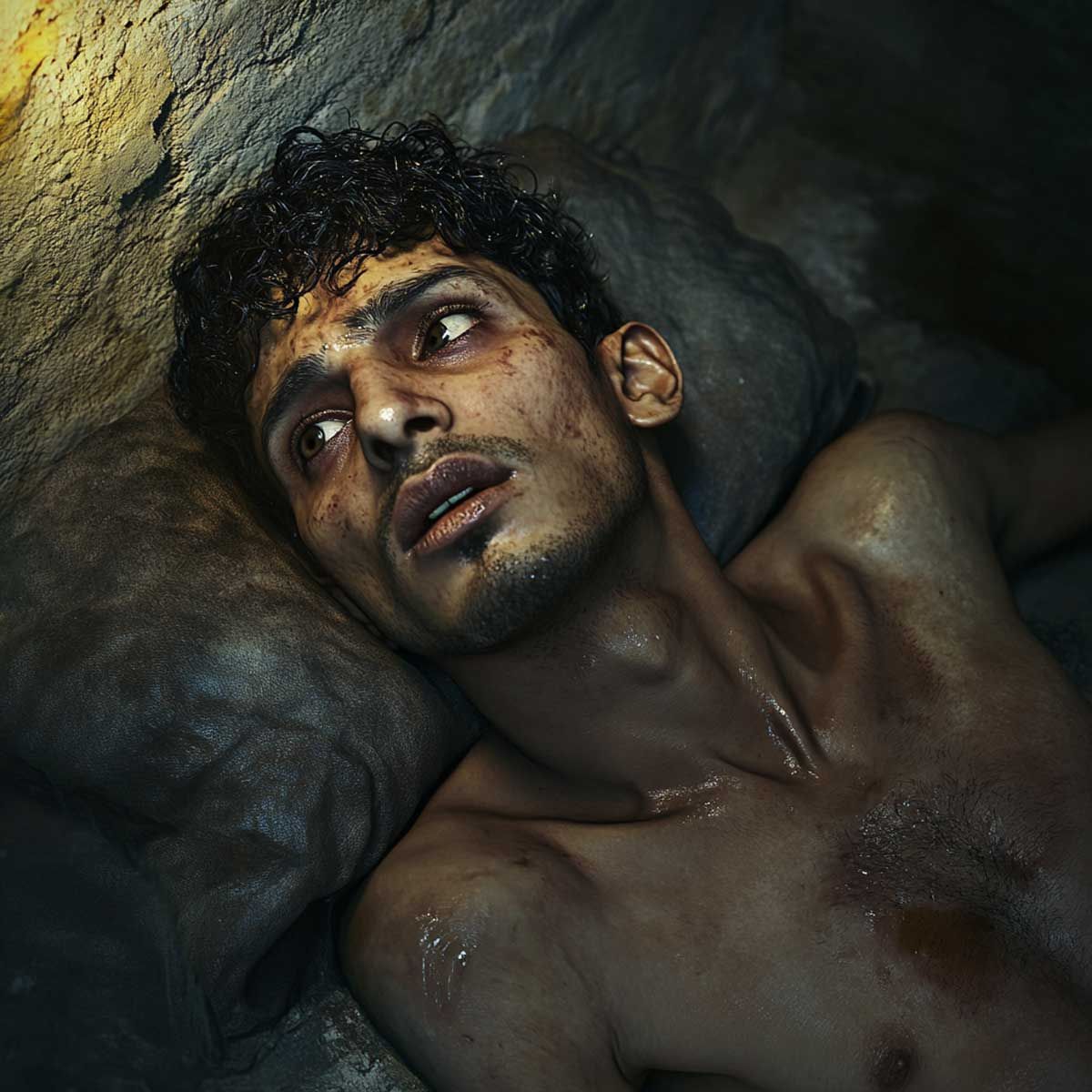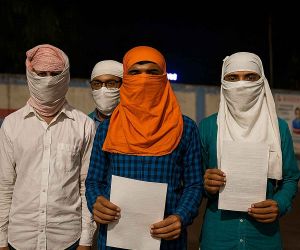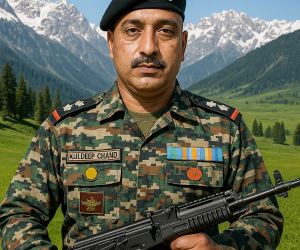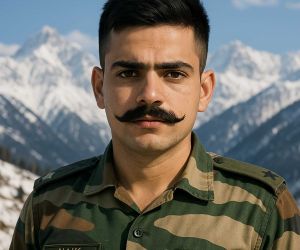MORE COVERAGE
Twitter Coverage
Satyaagrah
Written on
Satyaagrah
Written on
Satyaagrah
Written on
Satyaagrah
Written on
Satyaagrah
Written on
JOIN SATYAAGRAH SOCIAL MEDIA
"Unbreakable Resolve": Inbal Rabin-Lieberman spearheaded defense saving Kibbutz Nir Am, Avital Aladjem narrowly escaped Hamas, while an Israeli grandmother's demise broadcasted live, meanwhile German tourist, Shani Louk, faced unspeakable horrors

In a striking tale of heroism amidst chaos, a young Israeli woman stands out, epitomizing bravery and leadership. Inbal Rabin-Lieberman, aged 25, emerges as a beacon of hope for the residents of Kibbutz Nir Am. This hamlet, located in the Gaza border strip, remains one of the few that escaped the devastating wrath of the recent Hamas attacks.
|
On the fateful morning of October 7, as terror loomed, it was Inbal who swiftly grasped the gravity of the unfolding scenario. Refusing to be paralyzed by fear, she took the helm of the village's defence strategy, as disclosed by Details. Her prompt and resolute actions ensured that Kibbutz Nir Am remained relatively unscathed amidst the widespread turmoil.
A testament to her capability and mettle, Inbal had been appointed as the military security coordinator for the kibbutz in December 2022. A native of Kibbutz Nir Am, her credentials are impeccable. Not only did she grow up understanding the nuances of her hometown, but she also actively served in the Israeli Defence Forces (IDF) combat units. To further sharpen her skills, Inbal pursued her education at the Women's Leadership School, ensuring she was aptly equipped to step up when adversity struck her community.
A community's safety rests significantly on the shoulders of the Military Security Coordinator. This pivotal role involves ensuring the protection of the community during both standard times and emergencies, right up until the IDF or police forces can be mobilized. Acting as the vital bridge, the coordinator serves as the primary "liaison" connecting the residents of the settlement, local governing bodies, and the security forces. What's notable is that the Defence Ministry budget solely finances this imperative position.
Inbal's journey to this esteemed role saw her succeed her uncle, Ami Rabin. When she took over the mantle in December 2022, her appointment was met with accolades and positive reinforcement. One of the notable figures to applaud her was Sha'ar ha-Negev Regional Council head Ofir Liebstein. Tragically, this commendation took a poignant turn as Liebstein fell victim to the terrorist's malevolence on October 7, 2023, further underscoring the gravity and unpredictability of the volatile region.
In Sha'ar ha-Negev, a significant mark in history was achieved when Inbal became the first female security coordinator in a kibbutz. Such a groundbreaking decision drew profound admiration and praise. The appointment, as Ofir Liebstein highlighted back then, showcased the progressive ethos of Sha'ar ha-Negev. "History in Sha'ar ha-Negev - first female security coordinator in a kibbutz! Inbal, replacing her uncle Ami Rabin. I am filled with pride at this choice," Liebstein proclaimed, emphasizing that the 'glass ceiling' was non-existent in their region, cherishing the principles of equality across all job roles.
What set Inbal apart wasn't just the position she held, but the passion and dedication she brought to the role. On that fateful morning of October 7, Inbal's instincts, training, and quick thinking shone brightly. She instantly gauged the severity of the impending threat, acting swiftly to arm the settlement's "rapid response team" or "kitat konenut".
The southern Israel kibbutz's website, yeshuvnik.net, was effusive in its praise, asserting that Inbal was unparalleled that day, becoming "the first in the entire State of Israel to realise what was happening." Her unwavering commitment and agile leadership were evident as she hustled from one dwelling to another, orchestrating a defense strategy. She galvanized the residents, structured a defense plan, and strategically positioned men at ambush points around the kibbutz's perimeter. Inbal Rabin-Lieberman's actions that day are a testament to her courage, foresight, and dedication to her community.
The kibbutz's fence bore grim evidence of the confrontation: the bodies of twenty-five Hamas militants who had sought to unleash terror upon the unsuspecting civilians of Kibbutz Nir Am. Each one of these militants met their end, thanks in significant part to the valiant efforts of Inbal and the defense system she orchestrated. The sheer tenacity and indomitable spirit of the residents under her guidance ensured that not a single terrorist could breach the kibbutz's defenses.
In the aftermath of this fierce showdown, like many of her fellow residents, Inbal, along with her family, chose to evacuate Kibbutz Nir Am. Seeking some respite and safety, they checked into a hotel in Tel Aviv. Here, amidst the somber backdrop of recent events, Inbal marked a personal milestone, her birthday, on October 9.
Highlighting the gravity of her recent heroics, Mayor Ron Huldai took the opportunity to personally meet and commend her. Huldai's sentiments were echoed by many, and he took to Facebook to express his admiration. "Inbal is a heroine," he declared, emphasizing the enormity of her actions. "Her story, which is being published everywhere, leaves no one indifferent - for her coolness, courage and bravery. Thanks to Inbal, dozens of lives have been saved. Thanks to her, Kibbutz Nir Am was saved."
While her recent heroics have thrust her into the limelight, those familiar with Inbal know her as someone who has always been civically active. Apart from her tireless service in the kibbutz, Inbal Rabin-Lieberman has also marked her presence on Kaplan Street, participating in protests against judicial reform. Whether on the frontlines of defense or amidst the throes of civic protests, Inbal continues to exemplify bravery, leadership, and a relentless drive to make a difference.
|
Harrowing Hours: Avital Aladjem's Near-Capture by Hamas Terrorists
In the ensuing chaos of the Hamas-led ambush, many found themselves confronted with horrifying decisions and unimaginable circumstances. Among them was Avital Aldjem, a resident of Kibbutz Holit. In an exclusive interview with Channel 12, Avital recounted the chilling tale of her temporary captivity alongside her friend Adi's children at the hands of Hamas gunmen.
The ordeal began when terrorists forcefully seized control of the kibbutz. But instead of any immediate harm, they placed Adi's children, who have been tragically separated from their missing mother since Saturday, under Avital's care. The situation quickly escalated when the terrorists decided to move them. "They took me and the children out of the houses and led us to the fence that surrounds the kibbutz," Avital narrated, her voice strained with the haunting memories of that day. The intent of their captors became clear as they neared a breach in the fence, ushering them towards the ominous threshold of Gaza.
The atmosphere was thick with fear and uncertainty, each step closer to the Gaza border intensifying the danger and despair. However, in a sudden twist of fate, just as they were on the cusp of being forced into the tumultuous territory of Gaza, the terrorists inexplicably chose to release them. The reasons remain shrouded in mystery, but to Avital and the children, it felt nothing short of a miracle.
The sheer terror of the ordeal serves as a stark reminder of the volatile nature of the situation and the unpredictable danger faced by residents of areas under threat. Avital's story is but one of many, spotlighting the very real and personal consequences of the ongoing conflict.
As dawn broke at 06:30 a.m., Avital, like many of her fellow residents, sought refuge in the Multi-Mission Device (MMD). "There were bursts of red paint. I was there alone," she recollected. The eerie silence inside the MMD was pierced by the disturbing sounds from outside: a cacophony of screams, incessant gunfire, and constant shelling. The true scale and nature of the assault remained unknown to her. Her last contact with her friend Adi, before communication was severed, was at 11:00 a.m.
The relative safety of the MMD was short-lived. By 1:30 p.m., the brutal reality of the day knocked on her door—literally. "The terrorists broke into my house. They blew up the door. My neighbor was murdered." Avital, in a desperate bid for survival, hid in a closet. But her hiding place was soon discovered, and she was dragged out by the terrorists, only to witness more horror. Adi's two children, Eshel, a mere infant of four and a half months, and Negev, a four-year-old, were forced into her presence.
She described the subsequent events with palpable distress. "They moved us from house to house. Everywhere, there was destruction and blood." The terrorists didn't spare anything, torching houses and vehicles. But the worst was yet to come. With threats and guns at their backs, they were forced towards the breached kibbutz fence, the terrifying pathway to Gaza. "All the time they told me: 'Hurry, hurry.' There were constant shots." In this nightmarish procession, they crossed into unknown territory.
Avital's ordeal paints a haunting picture of the violence and fear that residents faced. Her story serves as a grim testament to the human cost of conflict, a sobering reminder of the reality on the ground.
|
The ordeal of Avital Aladjem, recounted in chilling detail, underscores the heart-wrenching trauma and sheer terror faced by civilians amidst the chaos of the Hamas attack. Her narration of those fateful moments provides a harrowing insight into the human toll of warfare and the tenacity it takes to survive.
"Negev was on the shoulders of one of the terrorists," Avital began. The little boy's distressed screams filled the air, pleading to be put down. Avital cradled baby Eshel protectively, but as they neared the threshold of Gaza, with its looming buildings in sight, the terrorists whisked Eshel away, and she was left only with Negev. A heart-stopping moment ensued. It was in this state of abject terror that a surprising act of mercy occurred: The terrorists gestured for her to leave. "They just walked towards Gaza, and I realized we were free."
The realization brought little comfort. They were in Gaza, an unfamiliar and hostile terrain. Avital found herself in an unthinkable situation: stranded with two small children, one of whom, Negev, bore painful shrapnel wounds on his leg. Despite the injury, his courage shone bright. Avital's voice trembled as she recounted their daring escape: "I managed to return home, alone on foot with the two children." The shattered fence, which once marked their confinement, now became their doorway to freedom.
Navigating their way through the rubble and devastation, they sought refuge at a neighbor's house in the kibbutz. The palpable relief when they made contact with the children's father was overwhelming, marking the end of their terrifying journey.
"We were already behind the perimeter fence, towards Gaza. I saw the houses of Gaza in front of me. When they took me out of the MMD, they dressed me in three skirts so that I would be modest.I made a sling out of the skirts.A negev who was wounded in the leg by shrapnel, crawled and was with me a little on the back.He walked, he was brave.There are bombs on the way all the time.When we reached the border I saw another squad of terrorists.they saw meI took the children and we hid behind a hill of sand.They did not harm us and continued to Gaza.We kept walking, I believed we would arrive, I knew the children had to go home."
When we arrived at the kibbutz the fence was closed, the breach was repaired.We rested for a moment, I waited for some sort of rescue to arrive.No one came.Negev fell asleep on the sand.There were no more terrorists in the kibbutz.I saw the movement of our vehicles, of people who were saved.Through some kind of gap in the fence I let the children in.We entered one of the neighborhoods, someone came in front of me and shouted: 'Who are you?'I understood that it was Israeli.We entered one of the houses."
"We arrived at the neighbor's house in the kibbutz and called their father. From there they took us to the borders. Their mother is missing, they need her to return home, to return Adi to her children. The children are being treated at Shaare Zedek, were left for observation at night. The Negev was injured in the leg, he has a fracture, a bullet penetrated his leg . The little one, four and a half months old, who inhaled a lot of gunpowder and the lung function is not good. He has a fever, but they will both get over it, because they are strong. We will give energy to these sweet children until their mother comes home."
|
Israeli girl describes how Hamas terrorists killed her grandmother and uploaded gruesome video on her Facebook page
In the digital age, where social media platforms have transformed communication, providing instant connection across the globe, they also have a dark side, exploited by those with malevolent intentions.
The cold-blooded live-streamed murder of an elderly Israeli woman is a grim testament to the depths to which the Hamas terrorists have stooped in their campaign of terror. Using the woman's own Facebook account as a means of broadcasting the brutal act was not just an act of violence, but also one of psychological warfare, aimed at sowing terror and dismay in the hearts of those who witnessed it.
The trauma was deeply felt by the deceased's family. In a heart-wrenching testimony shared with Visegrad24, the woman's granddaughter detailed the harrowing experience of stumbling upon the video. “My mother could not open it as she was trembling. I opened it from my phone and I saw the worst you could possibly imagine.” Her words paint a chilling image, underscoring the immense psychological impact such acts of terror can have on individuals and communities alike.
The incident serves as a stark reminder of the challenges posed by the intersection of technology and conflict in the modern era. While social media platforms provide unparalleled opportunities for connection and communication, they also offer terrorists an easy means to propagate their violent ideologies and strike fear in the hearts of civilians. The international community, tech giants, and individual users must come together to ensure that such platforms are not misused to further the agendas of terror organizations.
|
Hamas's Barbarism on Display: The Morbid Parading of a German Tourist
The wave of terror unleashed by Hamas on Israel has taken yet another dark turn with the emergence of a video showing the degrading treatment of a dead German woman. Such acts are not just acts of violence, but are calculated to incite fear, outrage, and garner attention.
The deceased, identified as Shani Louk, a German tourist, found herself in the midst of this conflict, a victim of circumstances beyond her control. The video showcases the despicable depths of degradation the Hamas terrorists are willing to stoop to in their campaign of terror. The chanting of religious slogans by the Hamas terrorists while parading the deceased is a clear attempt to frame their violence within a religious context, despite the act having no basis in the tenets of Islam.
The reactions to such acts of brutality serve to further entrench the divisions between the warring factions. Israel, understandably outraged by such provocations, has ramped up its military response with intensified airstrikes on Gaza. The blockade imposed in the wake of these events has had the unfortunate effect of making life even more difficult for the civilians of Gaza, many of whom have no direct involvement in the hostilities.
Hamas's announcement of their intention to televise the execution of hostages in retaliation for any Gaza civilian deaths resulting from Israeli airstrikes is deeply troubling. Such threats underscore the urgent need for a mediated solution to prevent further escalation and loss of innocent lives on both sides.
The international community must condemn such acts in the strongest terms and work towards a peaceful resolution. This conflict is a reminder that it's often innocent civilians, like Shani Louk, who bear the brunt of political and ideological battles.
The spiraling violence in Israel reached a chilling climax when Abu Ubaida, the spokesman for Hamas's Military Wing, Al-Qassam Brigades, declared on Al Jazeera their intent to broadcast live executions of hostages, as retaliation for each bomb dropped on Gaza's civilians by Israel.
|
|
Gaza, renowned as one of the most densely populated territories globally, is now a hotspot for civilian casualties. Hamas has long been criticized for its strategies, embedding its operations within civilian domains, which puts innocent lives at direct risk. Their notorious use of civilians, including children, as human shields, further exacerbates the peril faced by Gaza's residents.
Israel, still reeling from the shock of the sudden attack that claimed over 900 lives and left thousands injured, responded with a declaration of war on Hamas. The consequent bombardment of the Gaza Strip has continued unabated for two straight days. This decision has garnered the support of the US and other NATO nations.
Yet, the distressing reality remains: hundreds of Israelis and foreign nationals are now in Hamas's clutches. The brutal attack on a music festival and the merciless targeting of homes in Southern Israel have sown fear in the hearts of the country's residents. Graphic content flooding social media, showing Hamas terrorists committing heinous acts against civilians, including women, children, and the elderly, only amplifies the dread.
The extent of the hostage situation remains uncertain, with no accurate figures available. But the pressing need of the hour is a swift and effective resolution to this crisis, ensuring the safety of the countless innocent lives caught in this political crossfire. The international community must act to de-escalate the situation and push both parties towards a ceasefire, ensuring the safety and security of civilians on both sides.
|
 Support Us
Support Us
Satyagraha was born from the heart of our land, with an undying aim to unveil the true essence of Bharat. It seeks to illuminate the hidden tales of our valiant freedom fighters and the rich chronicles that haven't yet sung their complete melody in the mainstream.
While platforms like NDTV and 'The Wire' effortlessly garner funds under the banner of safeguarding democracy, we at Satyagraha walk a different path. Our strength and resonance come from you. In this journey to weave a stronger Bharat, every little contribution amplifies our voice. Let's come together, contribute as you can, and champion the true spirit of our nation.
 |  |  |
| ICICI Bank of Satyaagrah | Razorpay Bank of Satyaagrah | PayPal Bank of Satyaagrah - For International Payments |
If all above doesn't work, then try the LINK below:
Please share the article on other platforms
DISCLAIMER: The author is solely responsible for the views expressed in this article. The author carries the responsibility for citing and/or licensing of images utilized within the text. The website also frequently uses non-commercial images for representational purposes only in line with the article. We are not responsible for the authenticity of such images. If some images have a copyright issue, we request the person/entity to contact us at This email address is being protected from spambots. You need JavaScript enabled to view it. and we will take the necessary actions to resolve the issue.
Related Articles
- "Fading Star's Fumbles": Mia Khalifa, hailed for her 'talents' on adult platform, tried geopolitics with laughable naiveté, leading Playboy and Canadian broadcaster to exit ties, her 'expertise' on Hamas and India shows a comedic disconnect from reality
- "Shattered Peace": In a harrowing incident, a French school witnesses horror as a lad shouting #AllahuAkbar takes life of a teacher & injures many, attack aligns with Hamas call for 'Global Day of Jihad', France grapples with terror amidst rising tensions
- "Red Lines": King Abdullah II stands firm in shielding Jordan from the refugee influx, reflecting a consensus among all 57 Muslim-majority nations, yet, perplexingly, Indian leftists clamor in support of Hamas, neglecting broader geopolitical realities
- As Europe grapples with surging anti-Semitism, countries like France and Germany clamp down on pro-Palestine protests, amidst the tumult, the Israel-Hamas conflict intensifies, casting shadows of unrest globally and challenging diplomatic ties
- "Stand With Us or Against Us": US Sec Blinken at UNSC, 'Whether in Mumbai or Israel, acts by ISIS, Hamas, or LeT are unjustifiable', Israel demands UN Chief's resignation, accusing him of justifying Hamas' attacks leading to mass murder of children, women
- Islamists are raging Land Jihad by encroaching iconic Maharashtra forts through illegal constructions within the premises, falsifying history by inventing fictional characters
- Freedom of expression and Secularism died with the assassination of Mahashay Rajpal, the publisher of Rangeela Rasool
- Sensational revelation, Pakistan based Islamic organisation Dawat-e-Islami has huge support in Ahmedabad and gets money from over 2000 donation boxes to brainwash Muslim youth and inspire terror activities
- ‘Tricked into religious conversion for marriage and then father in law demanded sex’, J&K woman reveals her ordeal
- Jihad stretching leg into schools: Bengaluru school student affirms teacher imposed class to pray to ‘better god’ Allah as punishment, the school says it was eye exercise
- Innocent Young Muslim children are being taught ‘how to kill Hindus’: Radicalisation, hate, and bigotry are ruining another generation, hundreds of videos on social media where children are seen declaring their desire to kill 'kaafirs'
- Islam Imposes an Emergency on India - Freedom of Expression
- Our Sisters and Daughters has to face Hell just because we choose to ignore the reality ourselves - Of fear or favour, we need to understand the reason why Hindu women seldom speak out on the atrocities unleashed upon them in grooming jihad
- "Error in identity, universal fallout": Fahad Qubati, an Arab Israeli from Nazareth, survives a violent attack in Greece after being mistaken for Jewish, amid growing antisemitism linked to the neo-Nazi Golden Dawn party and recent Middle East violence
- A sudden surge of Land Jihad in Gujrat is forcing Hindus and Jains to leave their homes resulting in localities to shift demography: A tale of two cities, Gopipura in Surat and Soni Falia in Bharuch

























